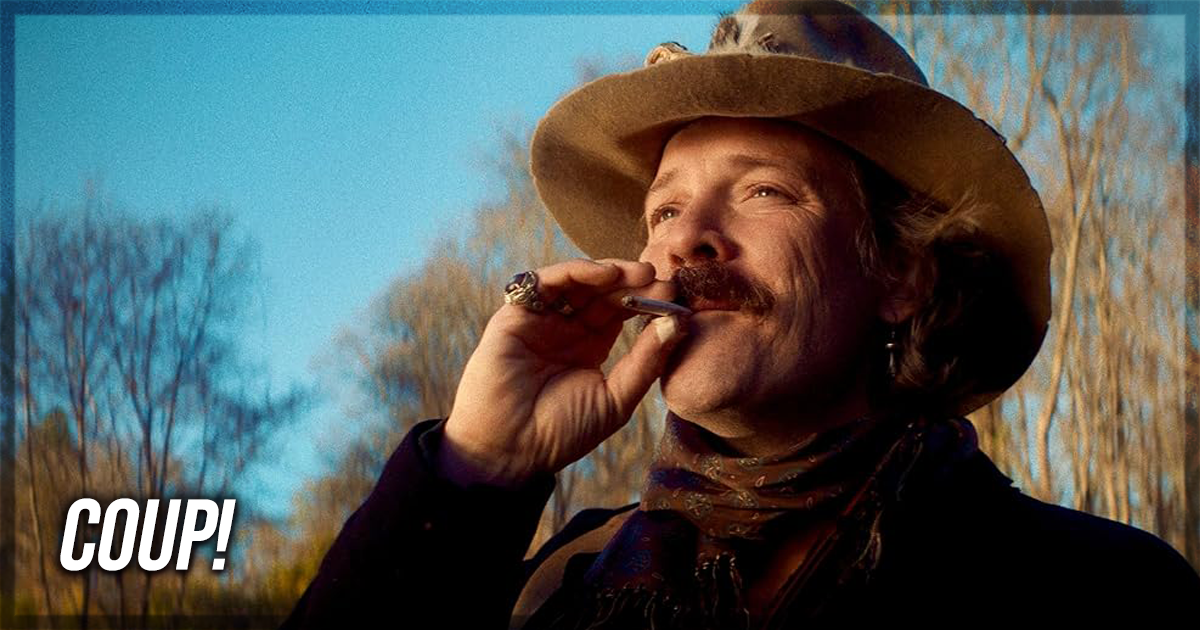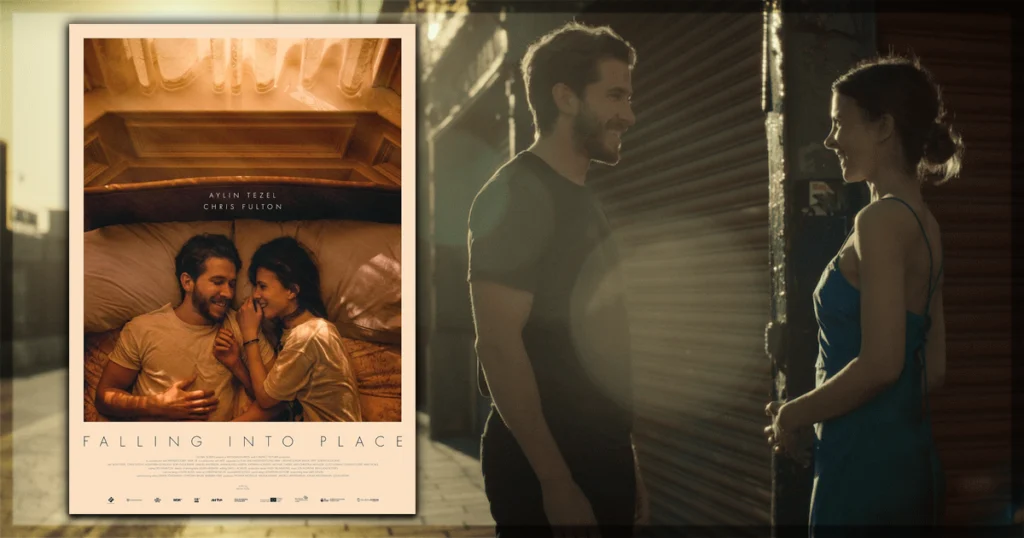Punctuation can speak volumes. The latest feature from writer-director duo Austin Stark and Joseph Schuman – Coup! – joins the ranks of Baz Luhrmann’s Moulin Rouge! and Richard Linklater’s Everybody Wants Some!! in adding an exclamation point to a punch title, immediately suggesting a zany, irreverent take on social paranoia during the 1918 Spanish Flu pandemic. As the world recovers from war and reels from a new, more insidious biological threat, the rich sequester themselves on their estates and allow only pre-approved people and deliveries through.
Floyd Monk (Peter Sarsgaard) is first seen shaving his facial hair and stealing a dead man’s passport, relying on this new passing resemblance and confidence in comportment and speech to take up the position of cook at the grand New England island estate – perfectly cut off from the concerns of the every day – of Jay Horton (Billy Magnussen) and his family.
The upstairs-downstairs dynamic and immense disparity of wealth and privilege may bring to mind Bong Joon-ho’s Parasite, but in its scandal-seeking yet essentially empty politics, Coup! is instead the Covid-conscious companion to last year’s Saltburn. The film’s attempts at a dual satire and provocation in its unsubtle yet meaningless class consciousness are no less muddled and toothless than in Emerald Fennell’s cause célèbre, but the result is similarly outrageous and entertaining. It is easy to sit back and enjoy the ride when the setting’s period details and individual characterizations are drawn with such over-the-top panache and when profundity is far from the mind.
As Horton, Magnussen professes the idealism of another Jay – Gatsby – while ultimately revealing himself to be more of a Tom Buchanan. He might have exposed his father’s dark secrets and the origins of his wealth through a newspaper career, but any concerns about progress and justice – and his plans to someday give over his estate to his servants, or as he insists he and everyone else call them, his staff – come second to ensuring the continued luxurious life he leads with his wife and children (all drawn as kindly and sympathetic figures, but not immune to the blindness of their station).
Sarsgaard is a lizard-like match for Magnussen, keeping Monk’s motivations simmering under the surface as he wins over (almost) the entire household. The thick Southern accent the imposter sports (and Sarsgaard delivers with aplomb) is loaded: to these coastal elites, its cadence acts as both a signifier of a lost gentility and a warning sign of treachery. In a smarter film, more could be made of these assumptions and wider American stereotypes about the southern states; for better or worse, Coup! is not that film.
The supporting cast of Horton’s staff know how to calibrate their characters to the time and place; a cameo from Fisher Stevens as Upton Sinclair, one of the era’s radicals and the only recognizable historical figure appearing in the narrative, is a delightful brief addition to the quarantined crew. The paranoia, shifting allegiances, and emerging symbolic conflict are hardly surprising, but these performances never grow stale within this secluded microcosm.
The eclectic score is drawn from the broad field of classical music and opera, up to Philip Glass’ Akhnaten, which premiered in 1983 – an anachronism to the film’s setting but a fun side step from pop-scored period pieces. Using opera clips in a film can be a tricky balance; the innate drama conveyed in the music and plot can sometimes directly contradict what is happening on stage, and other times make it clear that the creative team views the music merely as atmosphere without additional thematic purposes. It is pleasing that, in Coup!, the overly dramatic classical selections enhance the oddity and emotion of its characters and sequences. It helps that the notes the creative team often wishes to add via opera’s grandiosity – for instance, Siegfried’s Funeral March from Wagner’s Götterdämmerung – are more often sardonic than serious.
Despite the well-drawn period setting, modes of speaking and the characters’ general outlooks on life feel very modern. This might be a case of history repeating itself; people have always been people with the same desires, drives, fears, and cycles of systemic and societal inequalities. It also might be a case of Schuman and Stark not quite knowing how to make their satire sharp and specific, opting instead for something recognizable for audiences today in an attempt at universality. What is lost in Coup! is the chance to dig down into motivations beyond a vague sense of injustice and wealth disparity.
Where the film captivates most is oddly in its portrayal of a pandemic. Opening shots of empty streets and overflowing sick bays are reminiscent of the news cycle in 2020 without being gratuitous, but the mechanics of moving people, food, and goods into Horton’s isolated abode are meticulously captured to raise the stakes of Monk’s deception and ultimate quest. One wishes this specificity was brought to more relationships and plotlines in the film.
A breezy romp that comes in just under 100 minutes, Coup! entertains without offering much new on the dynamics of a pandemic society, where some lives are treated with more care than others. “Eat the rich” has never been a bigger joke.
Coup! is now playing at the Glasgow Film Festival.
Are you interested in seeing Coup!? Let us know by connecting with us on X @MoviesWeTexted.
You might also like…
‘Tummy Monster’ Interview with Director Ciaran Lyons and Actors Lorn Macdonald & Michael Akinsulire
‘Hesitation Wound’ Review: The Clash of the Human and the Corporate
‘Falling Into Place’ Review: Mental Health Aware Romantic Drama




